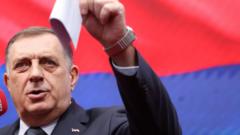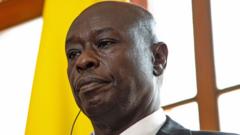At the world premiere of “Flowers of Srebrenica,” a new play in Sarajevo, the audience bears witness to a haunting reminder of the 1995 massacre, where over 8,000 Bosnian men and boys lost their lives at the hands of Bosnian Serb forces. The visceral performance underscores the pain and unresolved grief that continues to ripple through Bosnia and Herzegovina three decades later.
The Srebrenica massacre stands as a painful testament to the darkest chapters in Europe’s history since World War II. In July 1995, amidst a supposed safe haven under United Nations protection, Bosnian Serb forces, led by General Ratko Mladić, orchestrated a brutal campaign of violence against Bosniak ethnic groups, resulting in a systematic extermination of thousands.
Depictions of the massacre in the play showcase the personal belonging found among buried remains—watch faces and scraps of clothing—reflecting the enduring anguish for families still searching for closure. While many have been able to identify loved ones through DNA testing, the scars of that time have not healed, and divisions within society remain stark.
Contemporary Bosnia and Herzegovina is marked by enduring ethno-political fragmentation, primarily between Bosniaks and Serbs. In contrast to the shared grief witnessed in Sarajevo, government officials in the largely Serb entity of Republika Srpska frequently refute the existence of genocide, despite enduring judicial acknowledgment of these crimes in international courts.
Contentions over historical truths continue to fuel discord, epitomized by recent provocations from leaders like Milorad Dodik, who has escalated nationalistic sentiments and challenged decisions made by Bosnia’s international High Representative Christian Schmidt. The political landscape is destabilized by a push for legislation that seeks to withdraw from national institutions, alarming many and stirring fears reminiscent of earlier conflicts.
Memorial events marking the anniversary stand in stark contrast to surrounding areas in Republika Srpska, where reminders of the massacre are conspicuously absent. Yet, the Srebrenica Memorial Centre becomes a gathering point for those mourning the loss of their kin and advocating for recognition and reconciliation.
For residents who remember the era, the resurgence of ethnic tensions brings a sense of foreboding. Mirela Osmanović, who works at the Memorial Centre, voices concerns that the heightened rhetoric from leadership is reminiscent of the dangerous climate surrounding the Bosnian War, leaving locals feeling unprotected and anxious about their future.
Despite the difficult reality of contemporary sociopolitical dynamics, many across Bosnia continue to support messages of solidarity and peace within Srebrenica, signaling a persistent desire to honor the victims and refuse to let history fade into denial. Yet, the manipulative strategies of political leaders seeking to exploit these divisions create further obstacles on the path to healing for a nation still grappling with its past.









